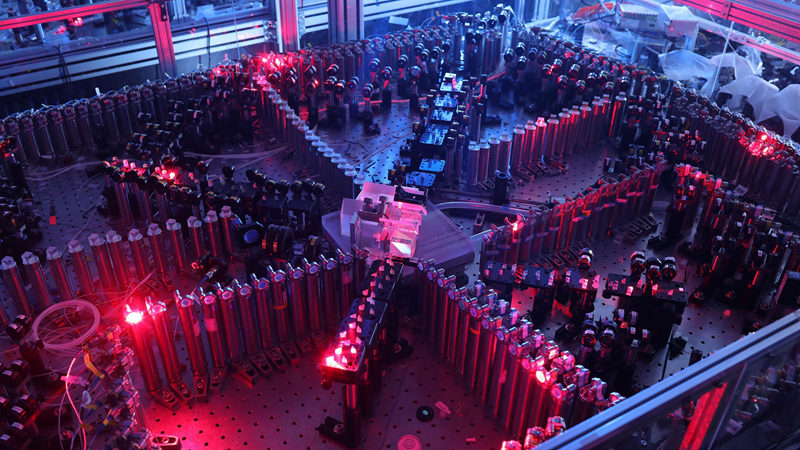


(Photo credit: University of Science and Technology of China)
HEFEI, Dec. 4 (Xinhua) -- A research team including renowned Chinese quantum physicist Pan Jianwei announced Friday a significant computing breakthrough, achieving quantum computational advantage.
The team established a quantum computer prototype, named "Jiuzhang," via which up to 76 photons were detected. The study was published in Science magazine online.
This achievement marks that China has reached the first milestone on the path to full-scale quantum computing -- a quantum computational advantage, also known as "quantum supremacy," which indicates an overwhelming quantum computational speedup.
No traditional computer can perform the same task in a reasonable amount of time, and the speedup is unlikely to be overturned by classical algorithmic or hardware improvements, according to the team.
In the study, Gaussian boson sampling (GBS), a classical simulation algorithm, was used to provide a highly efficient way of demonstrating quantum computational speedup in solving some well-defined tasks.
The average detected photon number by the prototype is 43, while up to 76 output photon-clicks were observed.
Jiuzhang's quantum computing system can implement large-scale GBS 100 trillion times faster than the world's fastest existing supercomputer.
The team also said the new prototype processes 10 billion times faster than the 53-qubit quantum computer developed by Google.
"Quantum computational advantage is like a threshold," said Lu Chaoyang, professor of the University of Science and Technology of China. "It means that, when a new quantum computer prototype's capacity surpasses that of the strongest traditional computer in handling a particular task, it proves that it will possibly make breakthroughs in multiple other areas."
The breakthrough is the result of 20 years of effort by Pan's team, which conquered several major technological stumbling blocks, including a high-quality photon source.
"For example, it is easy for us to have one sip of water each time, but it is difficult to drink just a water molecule each time," Pan said. "A high-quality photon source needs to 'release' just one photon each time, and each photon needs to be exactly the same, which is quite a challenge."
Compared with conventional computers, Jiuzhang is currently just a "champion in one single area," but its super-computing capacity has application potential in areas such as graph theory, machine learning and quantum chemistry, according to the team.

 Award-winning photos show poverty reduction achievements in NE China's Jilin province
Award-winning photos show poverty reduction achievements in NE China's Jilin province People dance to greet advent of New Year in Ameiqituo Town, Guizhou
People dance to greet advent of New Year in Ameiqituo Town, Guizhou Fire brigade in Shanghai holds group wedding
Fire brigade in Shanghai holds group wedding Tourists enjoy ice sculptures in Datan Town, north China
Tourists enjoy ice sculptures in Datan Town, north China Sunset scenery of Dayan Pagoda in Xi'an
Sunset scenery of Dayan Pagoda in Xi'an Tourists have fun at scenic spot in Nanlong Town, NW China
Tourists have fun at scenic spot in Nanlong Town, NW China Harbin attracts tourists by making best use of ice in winter
Harbin attracts tourists by making best use of ice in winter In pics: FIS Alpine Ski Women's World Cup Slalom
In pics: FIS Alpine Ski Women's World Cup Slalom Black-necked cranes rest at reservoir in Lhunzhub County, Lhasa
Black-necked cranes rest at reservoir in Lhunzhub County, Lhasa China's FAST telescope will be available to foreign scientists in April
China's FAST telescope will be available to foreign scientists in April